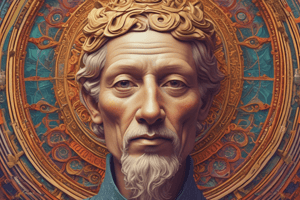Podcast
Questions and Answers
What were the main characteristics of the Enlightenment in Europe?
What were the main characteristics of the Enlightenment in Europe?
The Enlightenment was characterized by an emphasis on reason, scientific inquiry, and challenges to traditional authority.
How did perspectives on the Lisbon earthquake of 1755 illustrate shifts in Enlightenment thought?
How did perspectives on the Lisbon earthquake of 1755 illustrate shifts in Enlightenment thought?
The perspectives on the Lisbon earthquake shifted from viewing it as divine punishment to seeking rational explanations for the event.
What impact did new commodities from the Americas have on European society during the Enlightenment?
What impact did new commodities from the Americas have on European society during the Enlightenment?
New commodities like coffee, tea, and chocolate contributed to increased prosperity and transformed social interactions in Europe.
What themes did Montesquieu and Voltaire commonly explore in their critiques of European society?
What themes did Montesquieu and Voltaire commonly explore in their critiques of European society?
How did Rousseau's views on education differ from traditional methods during the Enlightenment?
How did Rousseau's views on education differ from traditional methods during the Enlightenment?
What role did enlightenment thinkers play in questioning traditional authority?
What role did enlightenment thinkers play in questioning traditional authority?
In what way did the Enlightenment address practical matters alongside theoretical concepts?
In what way did the Enlightenment address practical matters alongside theoretical concepts?
Why was satire an effective tool for Enlightenment writers like Montesquieu and Voltaire?
Why was satire an effective tool for Enlightenment writers like Montesquieu and Voltaire?
What was the primary purpose of Enlightenment salons?
What was the primary purpose of Enlightenment salons?
How did Enlightenment ideals influence fashion?
How did Enlightenment ideals influence fashion?
What was the significance of the Encyclopédie during the Enlightenment?
What was the significance of the Encyclopédie during the Enlightenment?
Define Deism as it relates to Enlightenment thought.
Define Deism as it relates to Enlightenment thought.
How did Enlightenment ideals contribute to anti-slavery movements?
How did Enlightenment ideals contribute to anti-slavery movements?
What economic principles did Adam Smith advocate during the Enlightenment?
What economic principles did Adam Smith advocate during the Enlightenment?
What concept does Rousseau's Social Contract illustrate about the state and individuals?
What concept does Rousseau's Social Contract illustrate about the state and individuals?
What does Kant's phrase 'Dare to Know' signify in the context of the Enlightenment?
What does Kant's phrase 'Dare to Know' signify in the context of the Enlightenment?
How did Jewish women contribute to the Enlightenment period?
How did Jewish women contribute to the Enlightenment period?
What were some challenges to the ideals promoted during the Enlightenment?
What were some challenges to the ideals promoted during the Enlightenment?
Flashcards
The Enlightenment
The Enlightenment
A period of intellectual and cultural change in Europe from the 17th to 18th centuries, characterized by emphasis on reason, scientific inquiry, and questioning traditional authority.
Shifts in Perception
Shifts in Perception
A shift in how people interpreted events during the Enlightenment, moving away from purely religious explanations and towards rational and scientific ones.
Everyday Life in Europe
Everyday Life in Europe
A period marked by increasing prosperity in Europe, influenced by new commodities like coffee, tea, and chocolate, and the introduction of new food sources like potatoes and corn.
Critiques of Tradition
Critiques of Tradition
Signup and view all the flashcards
Rousseau
Rousseau
Signup and view all the flashcards
Natural Education
Natural Education
Signup and view all the flashcards
Rote Learning
Rote Learning
Signup and view all the flashcards
Emile
Emile
Signup and view all the flashcards
Enlightenment Salons
Enlightenment Salons
Signup and view all the flashcards
Enlightenment
Enlightenment
Signup and view all the flashcards
Deism
Deism
Signup and view all the flashcards
Encyclopédie
Encyclopédie
Signup and view all the flashcards
Social Contract
Social Contract
Signup and view all the flashcards
Immanuel Kant's "Dare to Know"
Immanuel Kant's "Dare to Know"
Signup and view all the flashcards
Adam Smith
Adam Smith
Signup and view all the flashcards
Enlightenment and Anti-Slavery Movements
Enlightenment and Anti-Slavery Movements
Signup and view all the flashcards
Deism
Deism
Signup and view all the flashcards
Individual Responsibility in Deism
Individual Responsibility in Deism
Signup and view all the flashcards
Study Notes
The Enlightenment
- The Enlightenment, a period of intellectual and cultural change, spanned the 17th and 18th centuries in Europe.
- It championed reason and scientific inquiry, challenging traditional authorities and prompting investigations of established ideas.
- The Enlightenment extended beyond abstract concepts, addressing practical matters like social interactions, trade, and governance.
Shifts in Perception
- The Enlightenment triggered a shift in European thought, altering how people viewed the world.
- The Lisbon earthquake of 1755, for example, sparked diverse interpretations.
- Some theologians saw it as divine retribution, while others questioned this view, seeking rational explanations exemplified by Voltaire's critique.
Everyday Life in Europe
- The Enlightenment coincided with Europe's growing prosperity.
- New commodities like coffee, tea, chocolate, and tobacco shaped daily life and social interactions.
- American foods like potatoes and corn increased food availability, challenging the idea of perpetual hardship.
Critiques of Tradition
- Enlightenment writers, including Montesquieu and Voltaire, used satire to critique existing European customs and social structures.
- Montesquieu's Persian Letters provided a satirical European perspective via Persian travelers.
- Voltaire's Candide and other works mocked corrupt rulers and promoted a life of honesty and simplicity.
- These writers highlighted the inadequacies of both Eastern and European societies.
Enlightenment Values & Education
- Rousseau emphasized middle-class values like hard work, practicality, and domesticity for women.
- He advocated a natural, holistic education, contrasting with traditional rote learning, as showcased in Emile.
Enlightenment Salons
- Enlightenment salons, gatherings in wealthy homes, facilitated intellectual exchange and the dissemination of Enlightenment ideas.
- Philosophers, intellectuals, and others met, discussed ideas, and exchanged new books.
Fashion & Enlightenment Ideals
- Enlightenment ideals influenced fashion choices by promoting practicality and naturalness over artificiality.
- Men started wearing cotton clothing from India, rejecting traditional corsets.
The Encyclopédie & Knowledge Dissemination
- The Encyclopédie was a comprehensive compilation of knowledge, covering topics like natural rights, women's standing, and technical mechanisms.
- It embodied the Enlightenment's emphasis on practical knowledge and innovation.
The Influence of Deism
- Deism, a belief in a creator God who does not intervene in worldly affairs, characterized Enlightenment thought.
- Deists asserted that individuals are accountable for their actions, and the universe runs according to natural laws established by God.
Enlightenment and Human Rights
- Enlightenment principles were fundamental to anti-slavery movements in Europe and its colonies.
- The emphasis on reason and human rights challenged the ethical justification for the slave trade.
- Writers like Abbé Guillaume Raynal and Olaudah Equiano, a formerly enslaved person, exposed slavery's inhumane realities and promoted its abolition.
Adam Smith & Economic Thought
- Adam Smith challenged mercantilism, advocating for free trade, the division of labor, and laissez-faire principles, where individuals pursue self-interest in a market.
- He believed this system would lead to a prosperous society while acknowledging possible issues and advocating for mitigating social policies.
Rousseau & The Social Contract
- Rousseau's Social Contract examined the relationship between individuals and the state.
- He proposed a social contract where individuals voluntarily join a state representing the collective will, emphasizing obedience while also valuing individual perspectives.
Kant & Individual Reason
- Immanuel Kant emphasized individual reason and critical thinking.
- His motto, "Dare to Know," embodied Enlightenment's call for independent thought and challenging existing ideas.
- He believed individuals possess the ability to reason independently and make their own decisions, a core principle of individual freedom.
Jewish Women and Enlightenment Ideas
- Jewish women played an active role in Enlightenment discourse, participating in salons and contributing intellectually.
- Enlightenment's emphasis on reason and tolerance broadened opportunities for Jewish communities, exemplified by Moses Mendelssohn's optimism.
Challenges to Enlightenment Ideals
- Despite its progress, the Enlightenment's reliance on reason alone did not address all social injustices.
- Pseudoscience was sometimes used to perpetuate racism, sexism, and class inequalities.
- The application of Enlightenment ideals was inconsistent, sometimes justifying social inequalities alongside the core principles.
Conclusion
- The Enlightenment transformed European thought, advancing reason, individual liberty, and societal progress.
- Its legacy continues to influence our understanding of human rights, individual freedoms, and the pursuit of a more just and rational world despite its imperfections.
Studying That Suits You
Use AI to generate personalized quizzes and flashcards to suit your learning preferences.




